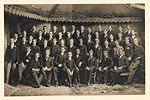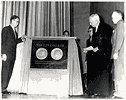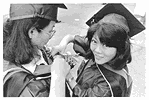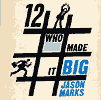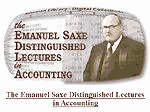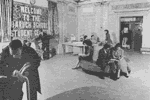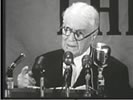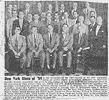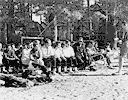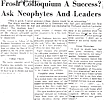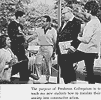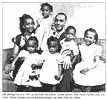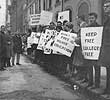History of Baruch College Book and Exhibit
4. TROUBLED
YEARS FOR
THE BARUCH SCHOOL:
1955-1962
Emanuel Saxe achieved legendary status at the School of Business, with a career where he became Chair of the Accountancy Department, then Dean of the School of Business and later was named the Martin Wollman Distinguished Professor in Accountancy. [Source: Baruch College Archives. Lexicon, c1953.]
These lectures are given several times a year to honor Professor Emanuel Saxe. [Source: Baruch College Archives.]
There was a tradition at what was now known as the Baruch School to have a Parent's Day where during the 1950s the goal was to influence parents to be supportive of their children's education as well as the college. It was thought that when parents understood what college life involved they would be less demanding of their children. [Source: Baruch College Archives. The Ticker, November 12, 1957. ]
The 17 Lexington campus was in need of a student center for many years. This desire was finally realized when 137 East 22nd street, formerly the Children's Court, was renovated and made available for student activities in 1960. [Source: Baruch College Archives. The Ticker, November 9, 1960.]
An ongoing complaint of students in the first half of the 20th century had been the lack of space for extracurricular activities. That changed with the opening of a Student Center on 22nd street in the former Children's Court building in 1960. [Source: Baruch College Archives. Lexicon, 1962.]
Bernard M. Baruch maintained his ties with his alma mater throughout his life. He contributed large donations, and also used his influence to raise the image of the college. In addition he communicated with various graduating classes spreading his wisdom. [Source: Baruch College Archives. Lexicon, 1962.]
Bernard M. Baruch was a generous benefactor to his alma mater, but he also supported the college in other ways. In the 1950s he often addressed the 23rd street audience at special lectures and ceremonies. In May of 1954, he gave a series of three lectures which were televised by NBC. All three lectures are available through the Digital Media Library. [Source: Baruch College Archives. Bernard M. Baruch School of Business and Public Administration, City College, May 11, 1954.]
4.8 1967 Morton Wollman Distinguished Lecture by Dr. John Johnson, "Decision Theory and Econometrics"
The Morton Wollman Fund was established in 1957 and it was to be used for a lecture series as well as for scholarships for outstanding students. [Source: Baruch College Archives. Morton Wollman Lecture Series, number 1, 1967.]
There were many specialized courses and programs offered during the 1950s, many to accommodate the vocational demands of returning G.I.s. [Source: Baruch College Archives.]
The history of the New York City Police Department and the municipal colleges can be traced to the 1920s when the Academy was headquartered in the Commerce Building of the College of the City of New York. In the 1940s in-service training courses were offered at the college, but it was not until the mid 1950s that the School of Business and the Police Academy were to unify their efforts into a degree program. The plan never happened and an Academy specifically for police training was authorized. [Source: Baruch College Archives.The Ticker, September 21, 1954.]
Freshman orientation from 1957 until 1962 included for about one-third of the students, a trip to Camp Isabelle Freedman in Falls Village, Connecticut, for a weekend before the beginning of the Fall term. Student leaders, faculty and staff provided them with an introduction to college life. [Source: Baruch College Archives.]
Starting in 1962 a freshman colloquium replaced the freshman camp. It was held at various hotels either in the Catskills or Poconos. The new colloquium program emphasized the academic side of college while the camp was used to emphasize school spirit. In September 1963 this activity was held at the Harmony Country Club in Monticello, New York. [Source: Baruch College Archives. The Ticker, September 23, 1963.]
The freshman colloquium replaced the freshman camp in the early 1960s. It was held in either the Catskills or the Pocono Mountains and emphasized the educational aspect of college. The freshman camp placed its emphasis on school spirit. [Source: Baruch College Archives. Lexicon, 1964.]
The municipal colleges were always a means to economic mobility for the working classes. Diverse ethnic groups began to take advantage of higher education in the middle decades of the 20th century. African-Americans were well represented as part of the evening-session students at the School of Commerce as evidenced by these images of an active 1940s student group and City College Alumnus, Hubert Mullings, and his family. There were chapters of the NAACP, the Douglass Society, and the Carver Society on campus and many students were active members. [Source: CUNY Matters, Winter 2001. Gary Schmidgall, "Picture Worth Almost 1000 Credits." Lexicon, 1944, Douglass Society.]
The Board of Higher Education wanted to create a university out of the municipal college system and along with this new status would be the end to the tradition, over one hundred years old, of free tuition. Tuition was first imposed in 1976. [Source: Baruch College Archives. The Ticker, November 29, 1960.]
Free tuition had been the hallmark of the municipal colleges of New York City. This was going to change with the Board of Higher Education's request to create a university out of the colleges and Governor Rockefeller's recommendation to impose tuition. Students rallied to keep the free tuition and there were demonstrations on all campuses. [Source: Baruch College Archives. Lexicon, 1961.]
It was not until 1965 that the Baruch School of Business and Public Administration started a Ph.D. program in business. [Source: Baruch College Archives. The Ticker, September 29, 1965.]
